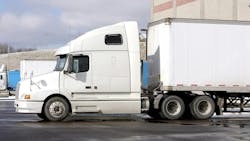Roeth: Fuel efficiency matters regardless of the powertrain
Key takeaways:
- Average trucking operational costs fell by 0.4% in 2024 due to lower fuel prices, but excluding fuel showed a 3.6% increase in overall costs.
- Fleets are focusing on long-term fuel efficiency through investments in technology and best practices, helping to mitigate the impact of fuel price volatility.
- Successful diesel fuel efficiency strategies can be applied to alternative-powered vehicles to improve their range and operational effectiveness.
The American Transportation Research Institute recently came out with its report: An Analysis of the Operational Cost of Trucking: 2025 Update. According to the report, the average operational costs of trucking decreased by 0.4% in 2024. Interestingly, the cost of fuel was down, but when you excluded fuel from the calculation, the cost of trucking actually rose 3.6%.
While lower diesel fuel prices can be viewed as good news, it’s important to remember that diesel fuel prices historically have been volatile. The average marginal cost of fuel per mile was $0.481 in 2024, while in 2022 it was $0.641. Regardless of the cost, fuel still represents a significant percentage of a fleet’s total operating costs.
The fuel cost noted in the report takes into account both the change in fuel price as well as changes in efficiency. If mpg improves, the cost per mile for fuel goes down. Lower per mile fuel costs can be driven by both mpg improvements and/or lower fuel prices.
Fleets and owner-operators that pay attention to improving fuel economy by making investments in things like aerodynamic devices for tractors and trailers, low rolling resistance tires, idle reduction technologies, etc., as well as engaging in operational practices such as setting engine parameters for fuel efficiency and optimizing routing make these choices for the long term. They do care about the price of fuel—that's obvious—but they understand that when it comes to fuel efficiency, you have to play the long game.
They can teach the industry a lot about making diesel-powered trucks as fuel efficient as possible for the long term. But I also think their influence can extend far beyond diesel-powered vehicles.
One of the knocks on alternative-powered vehicles in general and battery-electric vehicles specifically is that they are range challenged. Fleets claim that they need their trucks to cover more miles on a single charge, and I think if they applied some of the lessons fleets have learned about getting more mileage out of a gallon of diesel to their trucks powered by alternative fuels, they would get better range from their BEVs.
See also: How the freight recession made trucking less profitable
Aerodynamics is a good place to start. One of the challenges with battery-electric vehicles and hydrogen fuel cell vehicles is the gap between the tractor and the trailer. This is one of three primary areas of opportunities for reducing aerodynamic drag on a tractor-trailer combination. The underside of the trailer and the back of the trailer are the other two.
Regardless of fuel type, aerodynamic drag is real and if not addressed will result in fewer miles per gallon of fuel or diminished range from a battery electric or hydrogen fuel cell truck.
The good news is that diesel fleets have already had a great deal of success in addressing these challenges. While fleets operating compressed natural gas, battery electric, or hydrogen fuel cell trucks may not be able to bolt on the same devices as those found on diesel trucks, they do have a starting point for discussion with truck makers and manufacturers of these devices.
Fleets running alternative-fueled vehicles can also address things like idling and can institute driver training that ensures drivers are operating the vehicles in a way that allows them to achieve maximum range. Don’t discount the driver’s impact on freight efficiency in these alternative-fueled trucks. Make sure your drivers understand the role of regenerative braking and its impact on range.
Regardless of what’s powering your trucks, and regardless of how much that power costs, it is just good business sense to use as little fuel as possible while still getting goods delivered on time.
About the Author

Michael Roeth
Executive Director
Michael Roeth is the executive director of the North American Council for Freight Efficiency. He serves on the second National Academy of Sciences Committee on Technologies and Approaches for Reducing the Fuel Consumption of Medium and Heavy-Duty Vehicles and has held various positions with Navistar and Behr/Cummins.
